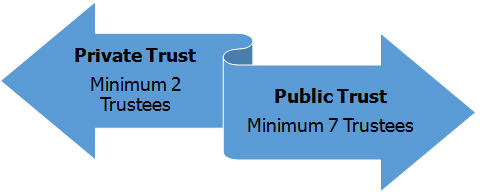Trust / Society

What is a Trust/Society:
The Indian Trusts Act, 1882 defines a Trust as an obligation annexed to the ownership of property, and arising out of a confidence reposed in and accepted by the owner, or declared and accepted by him, for the benefit of another, or of another and the owner.
- The person who reposes or declares the confidence is called the “Author of the Trust”.
- The person who accepts the confidence is called the “Trustee”.
- The person for whose benefit the confidence is accepted is called the “Beneficiary”.
- The subject-matter of the trust is called “Trust Property” or “Trust Money”.
- The instrument if any, by which the Trust is declared is called the instrument of Trust or Trust Deed.

Basic requirements of Trust:
Any person who is competent to hold a property can form a Trust.

Requirements for forming the Trust deed:
- Name of the Trust
- Name of the Trustee
- Objects and purpose of the Trust
- Aadhaar and pan card of the Trustees
- Place of Principal
- EB bill or rental agreement of the property
Statutory Compliances:
All Trusts are required to file returns as per Income Tax Act.
Gst may be applicable if it attracts any provisions of the GST Act.
Other compliances as prescribed by any other act or law.

